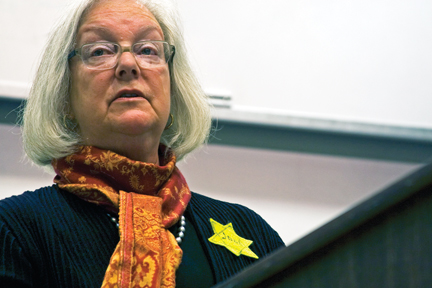
Holocaust survivor Louise Lawrence-Israels during a speech she gave on the Mesa State campus Thursday night. Lawrence-Israels, who was born in Haarlem, Holland, in the middle of World War II, bears the golden Star of David that the Nazis all Jews to wear for identification.
By Troy D. Sides
It was about 6:30 p.m., outside the Saccomano lecture hall in the science building on the Mesa State campus. People were slowly filing into the lecture hall to hear a talk by Louise Lawrence-Israels, who stood outside the doors finishing an interview with a television news reporter. Once the TV reporter began packing up his tripod, I approached her, simply the next of many nervous journalists to do an interview with one of the few remaining survivors of the Holocaust of World War II.
Lawrence-Israels’ presentation was to be the fifth of her day. Five times in one day she had to hash through every single memory she could from a time when over 11 million people were murdered. In one year, Lawrence-Israels travels to up to 40 locations across the country, giving the same talk about the same event.
How, one wonders, can this humble lady talk about such brutality and darkness so much? How does the soul, the heart, endure recounting experiences of one of the darkest times in history?
Lawrence-Israels’ dark, early life beProxy-Connection: keep-alive
Cache-Control: max-age=0
n only six months after she was born in the summer of 1942, when her family went into hiding in Amsterdam, the capital city of Holland. The Nazis had confiscated her father’s business in Haarlem, the town where she was born, and forced them to move to Amsterdam. In Amsterdam, her father found a third floor apartment and, with false identification papers in hand for protection, waited out the war.
Her memory is rocked by German war planes that, while flying across Dutch airspace to bomb England, would accidentally drop bombs over Amsterdam due to the shaking of the wings on which they hung. She and her family would be forced to duck into the apartment staircase, the strongest part of the structure, hoping the stray bombs would miss their apartment.
She re-lives the day, years after the war had ended, that she and her siblings learned they were Jews.
“Even with the last name ‘Israels,’” she said, “we had no idea that we were Jewish. My parents never talked about religion so that we wouldn’t tell people we were Jews.”
She somberly recalls moments like when her family friend, Selma, had her entire family killed by the Germans, and then wondering if Lawrence-Israels’ family would be next.
Moments like when, in a desperate attempt to ease the nearly constant hunger while living in the apartment, her and her siblings would eat tulip bulbs her father had picked after curfew (“Tulip bulbs are not edible,” she said).
Moments like one day when herProxy-Connection: keep-alive
Cache-Control: max-age=0
ather walked outside before curfew, a very risky thing to do, and came back in and said, “It sounds like peace outside. I think the war is over.”
“And then,” Lawrence-Israels said, “he explained to us what ‘peace’ meant.”
Moments like when she stepped outside for the first time, being three years old.
“My life during those first three years was four walls,” she said. “When I stepped outside, that’s when my life truly started.”
Experiences like those, lived by perhaps any other person, would break him or her. Yet Lawrence-Israels, with utmost calm and sincerity, tells her story dozens of times to thousands of people in one year.
“Why do you do it?” I asked her, my voice laced in awe. In only minutes she would enter the lecture hall, recounting every heartbreak suffered during those three years. “How do you re-live those moments over and over again?”
Lawrence-Israels simply smiled a small, sincere smile, then locked her eyes onto mine.
“Because I have a message,” she said, an unsurprised, nonchalant expression on her gentle face. “I just want people to start realizing that, yes, genocide is still going on today. Our hope is that it will go away. Hope is good, but you need action. We need young people to start speaking out against wrongs, but it takes courage to stand up.”
And so, for the next two hours, this humble, 68 year-old Dutch woman “stood up” in front of a packed lecture hall telling her story. An hour had passed, however, before she began talking about the war itself; until that point, she had simply been talking about her family. Having spoken so much about death for so much of her life, perhaps she was looking for a little release by talking about life. Eventually, though, she got to the heart of her story and her message that she has for the world.
“I would much rather talk blossoms and spring,” she said. “But that doesn’t bring a message.”
Recent Comments